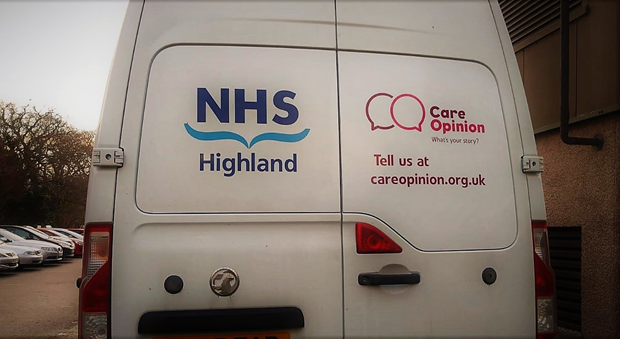
Here is the text of a speech I made at our Celebrating Care Opinion Scotland event in Edinburgh on 31 October 2018.
Thank you to Gina and the Scottish team for organising this inspiring event and to Paul Gray, Director-General Health and Social Care/Chief Executive of the NHS in Scotland, for also speaking.
The last time I had to make a speech in Scotland was in April 2014. That was at a reception at the Scottish Parliament with the cabinet secretary for health.
Gina suggested I just make the same speech again. She said you wouldn’t notice. But I can’t do that for two reasons.
First, it’s against our company values.
And second, an awful lot has changed since 2014. We’ve come a long way. And when I say “we”, I mean all of us here, all of you, and so many people who are not here too. Because we’ve all been on this journey together.
So what has changed since 2014? What have we achieved?
Well, in terms of Care Opinion itself, our platform has been worked on almost every day since.
We’ve added videos in British Sign Language. Partnering with Monkey Wellbeing, we’ve added pages to encourage children to share their stories.
We’ve worked with Talking Mats, another Stirling-based social enterprise with an international reputation, to add “picture stories” into Care Opinion to make it easier for people with dementia to share their stories. We hope picture stories will be helpful for many others who might struggle to tell their story with words alone.
We’re very grateful to the Life Changes Trust, based in Glasgow, for funding that work with Talking Mats.
Just recently we’ve updated Care Opinion to make it easy for staff to use it on tablets and mobiles. We’d like to go further in that direction: for example, soon we hope to be able to have native phone notifications on Android phones. It would be great if Care Opinion was easy to use for busy staff on the go.
Over the past two years we’ve also built a number of data visualisations, like word clouds, tag bubbles and story swarms, to help staff explore the stories and themes that matter to them. Our aim is to support real time learning and quality improvement for staff teams.
Technology only matters if it matters to people
This is all very well, but the technology only matters if it matters to people. And on that score, I’m pleased to report that as of now, all territorial health boards but one are subscribed to Care Opinion and developing their use of the platform. And while 1,200 Scottish patients posted a story in 2014, over three times as many will post a story this year.
And these stories are creating important impacts, both for those who tell them and those who hear them.
Story authors often tell us that sharing a story was “therapeutic”, that it allowed them to say what was important, what mattered to them. They could go at their own speed. They could tell their story their own way, in their own words. In anonymity they could feel safe enough to be honest about difficult things.
And staff tell us how much they value the original, unvarnished words of the patient or carer. The positive feedback lifts spirits. The negative feedback prompts discussion and change. Most of all, the authenticity and humanity of the feedback reconnects people with the values that took them into healthcare to begin with, but might have got lost along the way.
One story we have already talked about this evening, about extraordinary end of life care at Biggart Hospital, has been viewed over 50,000 times since it was told. Think of the learning that makes possible.
Tomorrow, we’re meeting with 11 palliative and end of life care teams (seven of them from Scotland) who are exploring the value of patient and family feedback in their services.
Another story, about a long and complex episode of acute care, received a response from staff in each of the five health boards which had provided care to that patient. And in all, stories from Scotland on Care Opinion have been viewed around 8 million times to date. So this is starting to become mainstream.
Back in 2014, I predicted that “the rest of the UK – and perhaps even other countries too – would learn from what was happening in Scotland”. And, slightly to my surprise, that turns out to have been true.
For example, in recent weeks Care Opinion Scotland has had a delegation from the Swedish Board of Health and Welfare, as well as requests for information from the US, Canada, Poland, Northern Ireland and Wales. All these countries recognise that Scotland is doing something which simply hasn’t been done before, and they want to learn from that unique experience.
Challenges
So we’ve come some way – but we haven’t come nearly far enough. There are still some important challenges to face.
First, patient awareness is low. Most patients will continue to access all kinds of care in Scotland without ever hearing about Care Opinion. We are progressing, but it is slow.
Second, staff awareness and engagement is also low. We think the amount of learning and change stories can create rises disproportionately with the number of staff who read them. We’d like an order of magnitude more staff to be able to hear stories of care – their care – in real-time. Imagine that instead of say 3,000 staff listening in Scotland, there were 30,000 regularly seeing stories on their phones or tablets. Or 60,000. Or 100,000. How much more learning, reflection, insight could that create?
Third, impact. We know that it’s not simple to turn feedback into better services. There are plenty of obstacles.
But some people seem to have the knack. They read a story and see the opportunities for improvement right away, and then they take action. You’ll see many examples of that online. We need to learn from those people: how do they do that? What enables decisive action? Authority, time, resources – or attitude?
Currently, a new real-time improvement project is just getting underway at Health Improvement Scotland, building on work reported earlier this year. It’s a structured approach to team-based QI which has shown promising results so far. This time round, teams will have the option to take feedback on Care Opinion as the starting point for improvement, and it will be interesting to learn whether that proves workable.
People need to know their stories are making a difference
But more than impact, we have to create visible impact. People – including story authors – need to be able to see that the service is listening and learning, yes, but also that it is acting on feedback. People need to know that their stories are making a difference.
At Care Opinion we promise that your stories do matter, and they can make a difference. So it is up to us to find new ways, more ways, to show the impacts we know stories are creating.
And fourth, culture. We talk about stories being culture and changing culture. Culture doesn’t change quickly, and the paternalism we know still exists in some services occasionally surfaces in stories and responses on Care Opinion. That old sense of the NHS as “charity” – you’re lucky to have it – is still sometimes evident.
We shouldn’t be surprised at this. One of my favourite quotes is from the engineer Roy Amara: “We tend to overestimate the effect of a technology in the short run and underestimate the effect in the long run.” I think that applies to Care Opinion. So if we think the direction of travel is right, the values are right, then we should keep going. But we should think in terms of years, not months.
One lever we have, in thinking about culture, is education. The stories people share on Care Opinion create an extraordinary public resource for learning of all kinds, and for all future health professionals.
Elsewhere in the UK, some universities have brought Care Opinion into the nursing and AHP curricula to support teaching around patient safety, quality, communication, improvement or inter-professional learning. It would be lovely to grow the use of Care Opinion in health professional education in Scotland too. We have yet to see a Scottish University commit to this.
One item on our to-do list is to create an app enabling every medical or nursing student in the country to receive a story a day on their phone, for learning and reflection. Perhaps that could be a further worthwhile contribution to culture change. Again, we must think about long term change.
The fundamentals remain the same
I’ve talked about the progress we’ve made since 2014, and the challenges we still face.
But the mission of Care Opinion, and the values which motivate us, haven’t changed at all since 2014. The heart of Care Opinion is still people: those who care, and those who are cared for. The active ingredient in all this is still the power of listening to one another.
And the joy is still in the fact that those who we think of as being cared for, as lacking ability or agency, are so often able to offer care. And those who we think of as the ones who provide care, the ones who are expert, the ones who are invulnerable, so often need and are offered care by their patients.
We must continue to nurture the generosity, reciprocity and curiosity which all meaningful conversations require, and which are, or should be, at the heart of health care itself. Generosity, reciprocity and curiosity: we can try to express these values in the site we build, and we rely on you to express them in the way you interact through the site.
You’re here because you understand that, and we’re only here because of you. You’ve supported us on this journey, advocated for us, encouraged us, shared stories, posted responses. We are doing this together, and we need one another.
So let’s continue, together, to continue to inspire change in Scotland’s health and social care services, and in other countries too, through the simple but powerful act of sharing and listening to stories. Let’s see how far we can go.
Celebrating Care Opinion Scotland
Celebrating Care Opinion Scotland https://www.careopinion.org.uk/resources/blog-resources/4-images/a4ad0e1854014ead9e40f262395417ca.png Care Opinion 0114 281 6256 https://www.careopinion.org.uk /content/uk/logos/co-header-logo-2020-default.pngUpdate from Care Opinion Scotland
Posted by James Munro, Chief executive, Care Opinion, on
Thanks for your feedback.

